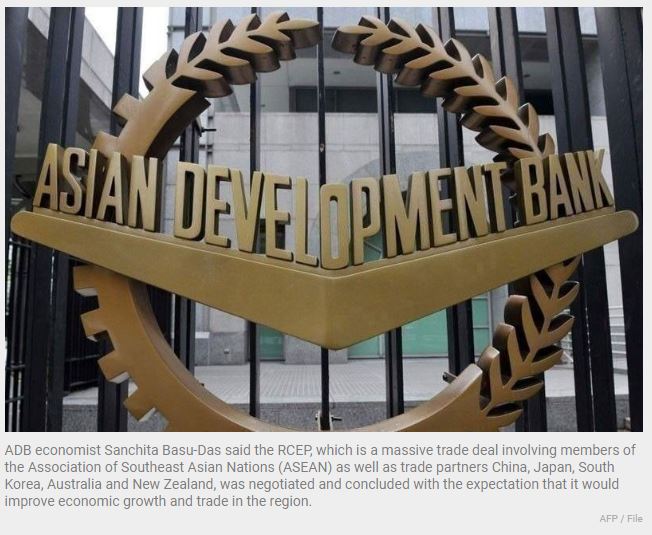Philippines: Urgent action needed in RCEP – ADB
MANILA, Philippines — Urgent action to unlock the benefits of the Regional Comprehensive Economic Partnership (RCEP) agreement will need to be taken by countries now amid high inflation and supply side issues, according to the Asian Development Bank (ADB).
In the multilateral lender’s latest blog, ADB economist Sanchita Basu-Das said the RCEP, which is a massive trade deal involving members of the Association of Southeast Asian Nations (ASEAN) as well as trade partners China, Japan, South Korea, Australia and New Zealand, was negotiated and concluded with the expectation that it would improve economic growth and trade in the region.
While the RCEP, which has potential to strengthen supply chains, increase incomes and create millions of jobs, came into effect in January this year for most of its members, Basu-Das said actions to unleash the trade deal’s potential have yet to pick up pace.
“The current economic climate with high inflation globally and continuing supply side problems give more urgency to the agreement,” she said.
The Philippines is among the member countries where RCEP has yet to take effect as the deal failed to get Senate concurrence in the previous administration amid concerns raised on the deal’s impact on the agriculture sector.
Earlier this month, Trade Secretary Alfredo Pascual said the current administration is committed to ratify the RCEP.
“As the countries are now emerging from their economic lows, the benefits of RCEP are needed more than ever. With national level ratification completed for most of the countries, attention shifts toward implementation and the way forward,” Basu-Das said.
She said the success of the RCEP would depend on its effective implementation.
The ASEAN Economic Community, which involves all ASEAN members, is seen to provide lessons in implementing regional cooperation measures like the RCEP.
Among Basu-Das’ recommendations for the implementation of the RCEP is for member countries to include their commitments under the trade agreement in national policies and institutions.
She said it is also important to create a support base for any new policy initiative.
“RCEP countries need to be mindful of the risk from ‘loss of purpose’ during implementation of provisions and hence should regularly hold dialogues with operational teams at the national level,” she said.
In addition, she said coordination with businesses regarding RCEP would be necessary to prevent low utilization of regional trade agreements.
“It is important to identify champions in industry who can help map industry supply chains to understand trade scenarios and the ways RCEP may help them further,” Basu-Das said.
She said assistance should be provided to small enterprises in terms of how they can benefit from RCEP.
“Member countries should also consider having their own advisory groups, either physical or virtual, to share information,” Basu-Das said.
She said monitoring and evaluation of the implementation of the RCEP would also be important.
RCEP governments have promised to set up a secretariat for this purpose, but it has been decided that for now, the ASEAN Secretariat in Indonesia will set up a separate unit to start the process of monitoring.
“While implementation at national level becomes a priority for RCEP economies, they should not lose sight of the future needs that are evolving with the changing global context,” Basu-Das said. She noted that new areas of policy focus have emerged, including digital economy and sustainability as the trade agreement was being developed.
Even as RCEP covers digitalization, she said more must be done to keep up with other regional digital deals, such as the Digital Economy Agreement, and the upcoming discussion on ASEAN Digital Economy Framework Agreement.
She said the RCEP should also look at how it can include climate mitigation and adaptation mechanisms.
“A section on environment should be included to support the Paris Agreement and countries’ commitment to meet net zero. It should promote trade and investment in low carbon goods and encourage technology-driven investments that support low carbon emissions,” she said.
By overcoming localized reluctance and working across borders, she said RCEP’s benefits can be enjoyed by everyone.
Source: https://www.philstar.com/business/2022/11/24/2225964/urgent-action-needed-rcep-adb


 English
English




